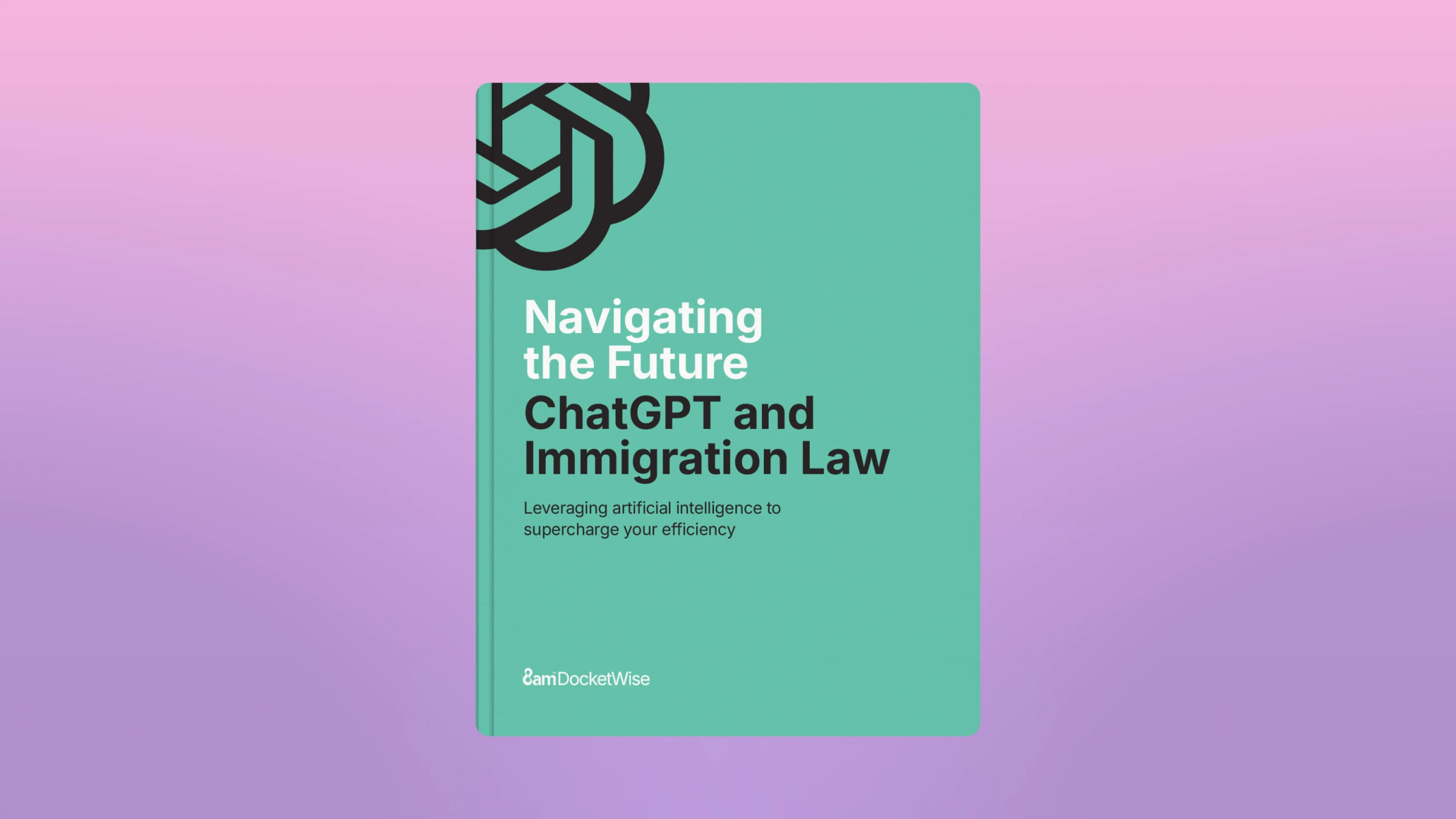The arrival of ChatGPT in late 2022 and what some of its early users have to say about their experience using it has people in all areas of life, including almost all professional industries, curious about its potential. This includes legal professionals, who are just as curious (and in some cases concerned) about how it could affect their work in the future.
In this article, we’re going to go through what ChatGPT is, what it can do, what people are saying about it, and its potential strengths and weaknesses specific to the immigration space.
First, what is ChatGPT in a nutshell?
ChatGPT is a form of AI, or artificial intelligence, that falls under what’s known as Generative AI. Generative AI refers to the ability of a computer to “create text, videos, photos, and other media using cutting-edge machine learning technologies.” The GPT in the AI’s name stands for Generative Pre-Trained Transformer, which means that it’s been prepared to pull information from multiple online sources to create content, answer questions, and have conversations. As of now, ChatGPT is free.
Before we go into more detail about the possible ways in which ChatGPT could be helpful to immigration lawyers, let’s examine the strengths and weaknesses it has in general, and some specific things to consider with regards to the legal space.
Pros and cons of using ChatGPT
Every new available tech tool comes with advantages and disadvantages, opportunities and challenges. First, let’s go into general pros and cons of ChatGPT.
Potential pros of using ChatGPT:
Access to information about almost anything
ChatGPT can provide information on virtually any topic very quickly, with a level of depth we had yet to see from AI. This can be a great time-saver when you are creating foundational materials to educate colleagues, students, or even clients. Instead of writing these materials from scratch, you can give ChatGPT a prompt to create materials on a specific topic, and revise for accuracy and tone.
ChatGPT creates coherent content, even if not always perfect
Early users seem to be generally impressed with the answers ChatGPT provides, and how quickly it can generate multiple paragraphs on virtually any topic. It’s not accurate on every topic, including technical topics like coding, but ChatGPT continues to learn from different sources of information, and the expectation should be that its output will become more sophisticated, and hopefully more accurate, with time.
ChatGPT can help people get quick answers to questions
ChatGPT excels at interactions following a question and answer format, or acting upon being given a prompt, which is a very natural and intuitive way in which people look for information. This potentially makes ChatGPT a more intuitive way to learn for professionals looking to expand their knowledge outside of their typical areas of expertise. Indeed, this is one of the reasons that Google is worried about ChatGPT - that people will go to it to get answers to questions instead of Google’s search engine.
Potential cons of using ChatGPT:
Here are some possible cons of using ChatGPT in a general context.
ChatGPT has limits to what it can do
An article in the Atlantic collected various instances in which, when given a prompt, ChatGPT either created something rather repetitive, despite the specific instructions provided, or claimed it could not complete the task due to being a chatbot. Users have also reported receiving answers with inaccurate or misleading information.
Using content created by ChatGPT could eventually impact SEO
ChatGPT is meant to be helpful to you, not replace you and your creative process. At the end of the day, no matter how polished ChatGPT sounds, it’s still a non-human, and content created by non-humans (e.g. bots) may be flagged by Google and make it harder to find in search results. While it’s not yet certain that Google will be able to do this, or indeed consider ChatGPT “auto-generated” content, the conversation is ongoing and can eventually post a risk to website SEO.
ChatGPT may produce harmful or biased content
ChatGPT users who have tried to create different varieties of harmful content to test the AI’s limits have found mixed results. The Atlantic review listed above explains, for example, that while ChatGPT rejected a prompt to explain how to bully someone, it may provide inconclusive responses to more morally problematic behavior, and, according to users testing the platform, checks that may be in place to keep people from using the AI for harmful content may be easily circumvented with plays on words. There are also concerns about ChatGPT having inherent bias and other undesired attributes, which is always a cause for concern.
These are some general concerns with the use of ChatGPT, which are applicable across the board. As an immigration lawyer, however, what are the specific implications of using ChatGPT?
Implications of ChatGPT for the immigration industry
As with any new tech tool, lawyers are beginning to grasp the potential applications of ChatGPT on the field. Right off the bat, thanks to its vast knowledge and ability to write in very clear English, lawyers who have tested the technology state that it does seem like the knowledge that ChatGPT has been trained on includes legal knowledge, which means it may be useful when researching legal issues, create court briefs, drafting contracts, providing commentary on recent procedural and regulatory changes, and more. Lawyers who work within the court system may find value in testing their arguments against ChatGPT, for example, especially as it continues to get trained on legal datasets.
It’s also important to make sure that if you’re using ChatGPT to save time drafting content, for example, it still carries your voice and explains information in a way that connects with your audience. Most importantly, if you use ChatGPT, make sure to revise the answer you get for bias, misinformation and completeness.
What are some ways immigration lawyers can use ChatGPT?
While this is neither an endorsement of the use of ChatGPT or a definitive guide on how to use it for immigration lawyers, we wanted to note at least a few things you can do, or at least try to do with it.
Generally, to create legal content, all that ChatGPT needs is “instructions from you about what topics or practice areas to write about, what you would like it to include, and how long it should be.” More specifically, here are some ideas on what you can try with ChatGPT as an immigration lawyer:
General immigration information to share with clients, including introductory guides to various visa types, visa application checklists, immigration terminology definitions, and more.
Law firm marketing content, including blogs, social media posts, video scripts and more, which could make it easy for lawyers using social media as part of their marketing strategy but who don’t have a marketing team on staff.
Create initial drafts of various immigration documents that normally require long-form writing, such as National Interest Waiver cover letters, immigration business plans, country condition reports for asylum applications, and Request for Evidence (RFE) response cover letters to name a few. The emphasis there is on initial drafts.
If you’re intrigued, give ChatGPT a try here.
Professional standards to keep in mind when using ChatGPT
As a lawyer, you are responsible for the accuracy of the information you provide to your clients. If you pass on inaccurate information created by an AI, you are held responsible, not the AI. Thus you should always be aware of the model rules of professional conduct and specific rules set by your state bar association, and provide your clients with the most accurate information in accordance with applicable laws.
For now, ChatGPT seems to be a potentially helpful tool to experiment with and potentially create very simple content with. However, most agree that it’s not going to replace legal professionals anytime soon.
While you experiment with ChatGPT, use Docketwise for your immigration case management
Technology and automation such as ChatGPT is created with the goal of being helpful and making people’s lives easier. Well, just like ChatGPT was created to be helpful, so was Docketwise. Developed by immigration lawyers for immigration lawyers, Docketwise streamlines and automates the administrative parts of your work — from client intake to invoicing to form filling — so you can focus on what’s most important: supporting your clients.
From a full library of immigration forms to client questionnaires in multiple languages to an industry-leading set of API integrations, we help you stay up to date on all your cases, communicate easily with your clients, and otherwise build and manage your firm.
If you want to learn more about Docketwise, schedule a demo at the link below, or sign up for our Immigration Briefings newsletter for daily and weekly immigration updates!
Transform Your Practice with ChatGPT
Discover how AI, particularly ChatGPT, can revolutionize your practice, from automating tasks to mastering effective prompting.
Download Now
About the author

James PittmanAttorney & Co-Founder8am Docketwise
James E. Pittman is a distinguished immigration attorney, co-founder of 8am DocketWise, and Director and Subject Matter Expert (SME) in immigration at 8am, a leading platform delivering purpose-built solutions for legal and accounting professionals. A former patent attorney, he later built a highly regarded U.S. immigration practice and is a sought-after CLE educator on immigration law and ethics. James is admitted in NY, NJ, before the USPTO, and hosts the DocketWise video podcast Immigration Uncovered.
